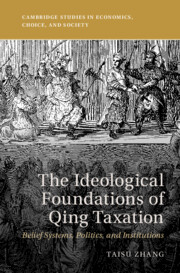Book contents
- The Ideological Foundations of Qing Taxation
- The Ideological Foundations of Qing Taxation
- Copyright page
- Dedication
- Contents
- Statistical Tables
- Preface
- Acknowledgments
- Introduction
- 1 A Short History of Qing Taxation
- 2 The Uses and Limitations of Rationalist Explanations
- 3 Pre-Qing Fiscal Regimes
- 4 The Early Qing Paradigm Shift
- 5 Mid-Qing Entrenchment
- 6 Late Qing Reforms
- 7 Theoretical Implications
- Conclusion
- Abbreviations of Sources
- References
- Index
4 - The Early Qing Paradigm Shift
Published online by Cambridge University Press: 02 February 2023
- The Ideological Foundations of Qing Taxation
- The Ideological Foundations of Qing Taxation
- Copyright page
- Dedication
- Contents
- Statistical Tables
- Preface
- Acknowledgments
- Introduction
- 1 A Short History of Qing Taxation
- 2 The Uses and Limitations of Rationalist Explanations
- 3 Pre-Qing Fiscal Regimes
- 4 The Early Qing Paradigm Shift
- 5 Mid-Qing Entrenchment
- 6 Late Qing Reforms
- 7 Theoretical Implications
- Conclusion
- Abbreviations of Sources
- References
- Index
Summary
Chapter 4 examines institutional and intellectual trends in the early Qing, up to the end of Kangxi’s reign. It focuses on the intellectual and political response to the Ming collapse, which spurred a large wave of arguments, both scholarly and political, in favor of light taxes and a noninterventionist state. In contrast to the heavily moralistic tone of Ming fiscal conservatism, the trauma of the Ming-Qing transition drove early Qing elites toward a fiscal worldview that was both more “realist,” but also far more hostile toward state taxation. This hostility stemmed directly from a mainstream historical interpretation of Ming collapse that placed much of the blame on late Ming tax increases, which, in turn, seemed to have cognitive roots in Qing elites’ deep-rooted moral skepticism of state extraction. Mindful of this “history lesson,” and of ethnic tensions between Manchu and Han populations, the Qing political elite committed itself, both rhetorically and institutionally, to very low agricultural tax quotas. At the same time, however, no such commitment was made towards nonagricultural taxes due to the specific circumstances of the Ming collapse.
Keywords
Information
- Type
- Chapter
- Information
- The Ideological Foundations of Qing TaxationBelief Systems, Politics, and Institutions, pp. 158 - 210Publisher: Cambridge University PressPrint publication year: 2023
